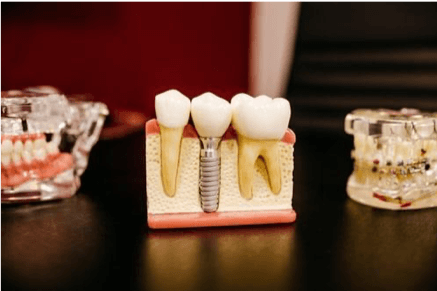Kids aren’t the only ones to lose teeth. Adults can suffer tooth loss for various reasons, including trauma/accidents, gum disease, tooth decay and bruxism (grinding), as well as severely misaligned teeth. A lost tooth isn’t just bad for your smile, it is bad for your overall oral health. Losing one tooth actually makes it more likely that you’ll eventually lose more teeth … because the empty space results in increased reliance on the surrounding teeth, which can lead to fracture from overuse. You’re also more likely to develop infections with the newly empty space in your gums.
If you find yourself with a new space in your mouth, know you are not alone! It is estimated that 178 million Americans are missing at least one tooth. Losing a tooth doesn’t have to be a traumatic or terrible experience, and it can be easily fixed with dental implants, in most cases.
An implant is generally the preferred option for replacing a missing tooth because implants help to maintain facial contours and preserve the alignment of the surrounding teeth. Implants are also the only dental restoration option that preserves natural bone, actually helping to stimulate natural bone growth.
What is an implant and how does the process work?
Placing an implant requires careful preparation to assess the amount of bone where the implant will be placed, which ensures that there will be adequate support for the implanted tooth. The implant itself is essentially an artificial tooth root made of titanium. Over several months, the implant begins to fuse with the bone. After the fusing process, known as osseointegration, abutment posts are inserted into the implant, to allow for the permanent attachment of the replacement tooth.
Once the dental implant is sufficiently anchored in the bone, a crown can be placed onto it. A precise impression is taken of the implant, which will convey to the dental lab the size of the implant and its position in the jaw. With our in-office mill unit and dental lab, we are able to fabricate the crown on-site, saving time, improving oversight and providing tighter control of work quality.
An abutment post is fabricated to enable permanent attachment of the replacement tooth. The customized crown is then seated onto the abutment and secured with either cement or via a screw.
When multiple teeth are missing, implants can be utilized to create a dental bridge or even to restore an entire set of teeth in a way that is much stronger and retentive than a traditional denture.
Are implants for everyone?
Almost! Implants are recommended for adults over the age of 18, because jaws and facial bones aren’t fully developed until adulthood. There’s a common misconception that there is an older age limit as well, but if you’re healthy and your jaw can support implants, you most likely are still eligible for dental implants, even as a senior. Age isn’t the only factor we consider when evaluating if implants are the correct way to go. We look at overall health and lifestyle as well. Some questions to ask yourself when deciding if implants are the right choice for you:
Do you regularly brush and floss? You need to maintain good oral hygiene to prevent bacteria from causing decay, cavities and, eventually, periodontal diseases like gingivitis.
Do you smoke or chew tobacco? Smokers are twice as likely to lose their teeth, compared with non-smokers. If you are considering getting implants, you will want to kick the tobacco habit.
How’s your diet? Teeth need a number of essential nutrients — like calcium, vitamin D, phosphorus, potassium and vitamin C — to stay strong. A diet lacking in those vitamins means your body doesn’t have the building blocks to keep your teeth strong, leading to increased risk for decay, breakage and tooth loss. Foods high in acid, sugar and carbohydrates are also shown to increase the plaque on your teeth, eventually leading to cavities and weakened teeth.
Do you have an autoimmune disease (like diabetes)? Any disease that affects your immunity can also cause tooth loss, because your body can’t fight off inflammation well.
Depending on your answers to the questions above, dental implants may be the perfect choice for your smile! While your smile may be hidden behind a mask for a while longer, YOU will know it’s bright, beautiful, and most importantly – HEALTHY under there!
We would be happy to meet with you about your suitability for an implant. We will explain the entire process and discuss what you can expect.
Contact Us Today
